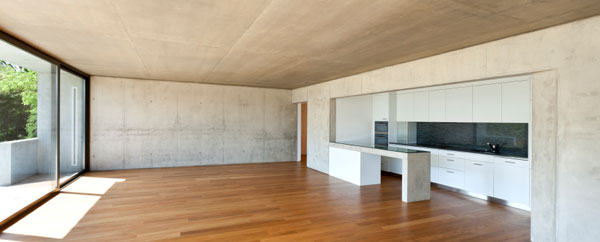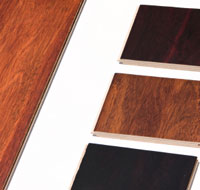Wood Flooring Over Concrete: Moisture Management Is Still Vital
Can hardwood flooring be installed over concrete?
The answer is “Yes, with a properly-prepared subfloor.” Concrete makes a strong and durable subfloor when installing hardwood floors. Hardwood flooring can be installed successfully on either on-grade or above-ground concrete slabs.
But before you begin, it’s important to understand that moisture measurement and management are crucial to both the concrete slab and also the hardwood flooring. You must test the concrete slab for excessive moisture; the hardwood flooring’s moisture content (MC) should be in balance with its surrounding ambient environment to support the beauty and longevity of the hardwood flooring.

Moisture Content Continuity
When installing hardwood floors over concrete subflooring, appropriate MC levels must be achieved. Wood and concrete both have independent, changeable moisture levels. Both materials’ MC fluctuates with ambient relative humidity (RH) changes. High humidity causes wood and concrete to absorb water vapor; low humidity causes both to release water vapor into the air. However, it can also transfer from other sources. Suppose a ground leak or faulty appliance introduces additional moisture to the concrete. In that case, it can upset the balance between ambient conditions and the conditions necessary to have hardwood look and perform at its best. The reverse is also true. Therefore, installers must make sure that MC levels are stable in all building materials before combining them.
 Building experts recommend that flooring installers allow time for wood flooring products to equalize to their surrounding environment before installation. The same general rule-of-thumb holds for concrete subfloors so that moisture content levels can stabilize.
Building experts recommend that flooring installers allow time for wood flooring products to equalize to their surrounding environment before installation. The same general rule-of-thumb holds for concrete subfloors so that moisture content levels can stabilize.
Moisture Meter Assessment
Moisture meter technology makes for precise and efficient moisture measurement in wood and concrete. Installers can quickly assess the surface MC of subfloor integrity with a concrete moisture meter or building inspection meter to find potential trouble spots in existing slabs, although newly-poured slabs would do better with a thorough moisture assessment by RH testing. Accurate moisture testing is crucial for the flooring product and any adhesive used in conjunction with the flooring.
After the concrete slab has been adequately dry, installers should also use a wood moisture meter to test the MC of the finished floor product before installation. Many wood moisture meter products available can measure the MC of most wood flooring species on the market today. By measuring and assessing concrete and wood moisture levels separately, builders and homeowners lower the potential risk of future moisture related problems when combining the two materials.
 It is important to be aware of MC variables within flooring materials. Many engineered hardwood flooring products can contain 3-12 multiple inner core ply layers of either a hardwood or softwood plywood type of material cross layered, glued and pressed together. The top layer is a thicker hardwood veneer wear layer that is glued and pressed on the top surface of the core. When installing these types of hardwood floors, installers must recognize that all composite wood products can contain different wood species with varying MC characteristics.
It is important to be aware of MC variables within flooring materials. Many engineered hardwood flooring products can contain 3-12 multiple inner core ply layers of either a hardwood or softwood plywood type of material cross layered, glued and pressed together. The top layer is a thicker hardwood veneer wear layer that is glued and pressed on the top surface of the core. When installing these types of hardwood floors, installers must recognize that all composite wood products can contain different wood species with varying MC characteristics.
Concrete and hardwood flooring have different moisture properties that must be understood for these materials to work well in tandem.
Hardwood Floor Moisture Never Stops
The process of installing hardwood floors over concrete slabs relates to moisture measurement and control. Throughout the process, builders and homeowners must ensure that the moisture readings obtained for each of the floor’s components, both the concrete slab and hardwood flooring, are good to go.
Excess moisture in either one can continue to plague stakeholders once they have finished installing hardwood floors. In a normal comfortable home, with slight RH changes throughout the seasons, the hardwood flooring responds naturally by expanding and contracting. This seasonal movement is a normal characteristic of wood flooring and never stops. One of the best ways to ensure that the hardwood flooring will give the optimum lifetime performance that a homeowner expects is to install humidity controls.
Reputable builders understand the value of using a proven moisture test for concrete slabs and an accurate wood moisture meter for hardwood flooring applications. The concrete-wood combination can be beautiful and lasting once moisture issues are addressed and managed.